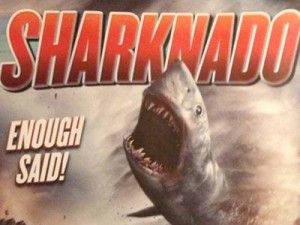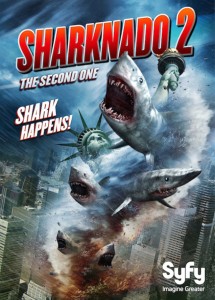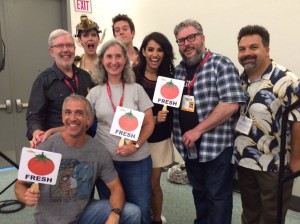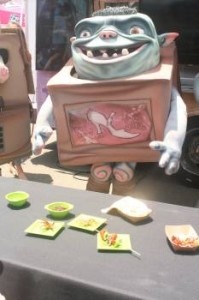Amid all the summer superheroes and blockbuster sequels, no movie has captured the 2013 movie zeitgeist as much as a low-budget movie for the Syfy channel. Of course, I am speaking of “Sharknado.” And yes, it is about a shark-filled tornado. Its tagline is simple, but effective: “Enough said.”
If tweets were box-office receipts, “Sharknado” could win the summer. Produced by Asylum for $1 million, it has become a sensation, with television rebroadcasts and a one-night special event theatrical release. And my favorite costume at Comic-Con. And yes, a sequel is in the works and they’re crowd-sourcing the tagline.
It was a pleasure to speak with “Sharknado’s” screenwriter, Thunder Levin, who is amused, delighted, and perhaps a little bit dazed by the reception for the film. He told me what a scientist had to say about this idea, what the movie has in common with “Snakes on a Plane,” and the famous fans he was most excited to hear from.
How has your life changed?
I got an agent and I’ve been going on a lot more meetings. I hope to move forward to bigger and better things.
It’s hard to imagine anything bigger or better than “Sharknado!”
It depends on how you use the words “bigger” and “better.”
What was your goal when you began to write the script?
To have as much fun as we could. The script I turned in should have cost $100 million to make. And they had $1 million. My vision would have been even bigger. I had flaming sharks at one point falling from the sky. And the whole thing was about LA being hit by a hurricane and flooded with water. We were shooting on sunny days, so it was limited how big it could finally be. The main thing was to have fun with it and not believe it could ever be too over the top. The big moment at the end with the chainsaw and anything, there was some concern expressed that maybe it was going to far. My response was, “It’s called ‘Sharknado.’ We can’t go too far.”
Yes, I think that should be the tagline for the sequel. Were you presented with the title?
They came to me with the title. I had made another movie with the production company, Asylum, last year. Everybody was pretty happy with it and we were talking about what to do next. They were talking about a movie to be called “Shark Storm.” I said, “Is this a straight movie with sharks attacking during a storm or is this going to be some crazy storm of sharks?” They said, “sharks attacking during a storm,” and that didn’t really interest me. Apparently, about the same time, SyFy had decided they wanted to make a movie called “Sharknado.” And so somehow the guys from Syfy were talking to the guys from Asylum and they discovered they both wanted to make a sharks in a storm movie. So they basically combined the projects and kept the better title. They said, “We want you to write a movie called ‘Sharknado,'” and I said, “What do sharks have to do with the North Atlantic Treaty Organization? Are they invading Europe?” I was thinking of NATO!
That’s a different species of sharks. So you have the title, and then what?
They had about half a page of notes, the stuff they’d like to see. I started from a fairly — I hesitate to use this word — realistic place about what would happen if LA was hit by a hurricane. We’re in the desert and our streets flood if there is five minutes of rain. If there’s a big rainstorm that’s the news all day, like two feet of snow in DC or New York. The city is not equipped to deal with it. It’s called the LA basin for a reason. It’s basically a shallow basin. So, if a hurricane hit Los Angeles, that much rain and a storm surge, the city would basically become like a lake. How would you get around and all of those problems. So I started with that premise, and then I added sharks! And tornados! And just kept going. If the ocean is washing into the city, why couldn’t there be sharks in the water? And if a hurricane spun off a tornado, which often occurs and creates a water spout, why couldn’t sharks be sucked up? There are verified cases of smaller fish being sucked up into water spouts and being deposited miles inland and so I took that to the next perfectly logical extreme. I don’t know why anyone wouldn’t find that believable!
Have you heard from any marine biologists or meteorologists about this idea?
Not directly, but I’ve read stuff online. Just a few days ago there was a quote from a JPL scientist who said that said it is incredibly unlikely but it is theoretically possible that sharks could be sucked into a tornado. It would have to be an F5 tornado and and there would have to be sharks there, but I felt vindicated!
How do you create a story for viewers to care about in the midst of a shark tornado?
There was more about the characters in the script. But we had a very short shooting schedule, just 18 days. Stuff gets cut, and for something like this the character development is going to have to go because they want the sharks and the killing and all that. But you have to care about the characters. Even though the situation is ridiculous, and the way we’re presenting it, the characters themselves have to exist in that reality. They can’t ever wink at the camera. They have to be in the moment and this is really happening to them. Otherwise it turns into a farce. It was important to me to make them as real as I could make them, give them a certain amount of background. I liked the idea of Fin and his ex-wife, the separated spouses, coming together and re-uniting because they have a shared history. A lot of people thought he had more chemistry with Nova, the gun-toting bartender, but I wanted Fin and his wife to have their past experiences come out and make them work together better as a team. Nova is from a different generation. I wanted the attraction between them to lose out to the less obvious but deeper relationship with his wife.
And the actors have to put themselves in the reality of the moment. Ian Ziering was kind of a revelation for me. I only knew him from “90210,” and I thought he really reinvented himself as an action star. He could do straight action after this. I think it’s just a matter of them committing to the reality of the character, no matter how extreme the situation we put them in, they have to say, “What would I do in this situation?” Really, that’s what acting boils down to.
What has been the best moment for you in the reactions to the movie?
Bleeding Cool picked up on the title last year and the reaction began building from that. The most amazing thing was trading tweets with Damon Lindeloff during the first broadcast. He tweeted that he would have a sequel written before the movie was done airing. I tweeted back that it should be a prequel, and he tweeted “touché” and we tweeted back and forth. To think that the guy behind “Lost” and “Prometheus” is trading tweets with me, about this ridiculous movie on Syfy, incredible. And Mia Farrow and Philip Roth tweeted about it! That’s just bizarre and surreal and amazing.
What is it that captivates people in a movie like this?
I was at the opening night of “Snakes on a Plane.” The audience I was with had a great time. They were laughing and shouting out lines and saying, “Hey look behind you!” and “Don’t do that!” and throwing popcorn at the screen. I know the movie didn’t do very well box office-wise, but the audience I saw it with had a great time. And I think that’s what happened when “Sharknado” was on, but in a virtual sense. It all happened on Twitter.
Unlike “Shakes on a Plane,” you didn’t have to face high expectations. You had the benefit of surprise.
And that’s something we’re going to have to deal with in the sequel. They’re going to see us coming. I haven’t figured out how to handle that yet.




 The 75th anniversary of Batman is a very big deal here, of course, with a great display of costumes and props from the Batman movies and appearances from the stars of the 60’s television series, Adam West and Burt Ward, to promote the release of the series on DVD. Even Starbucks got into the spirit.
The 75th anniversary of Batman is a very big deal here, of course, with a great display of costumes and props from the Batman movies and appearances from the stars of the 60’s television series, Adam West and Burt Ward, to promote the release of the series on DVD. Even Starbucks got into the spirit.